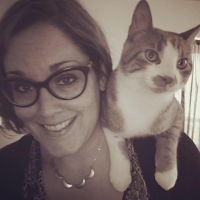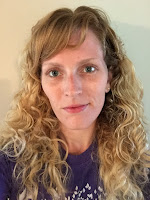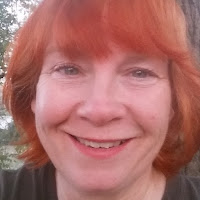Whose 9 Lives Are We Talking About?
Just who are these nine lives and what will we reflect on this year?... read more about our individual inquiry below. Look for our first, reflective blog post soon!
My name is Jean Dempsey and I am starting my sixth year at St. Louis Community College, where I teach English as a Second Language. My students are already proficient in everyday English, but they need to develop their academic English (especially writing and grammar) in order to prepare for English 101 and other reading and writing intensive classes at the college. During my time teaching ESL, I have noticed that students might do quite well in their grammar classes, yet they still make lots of grammar mistakes in their writing. The focus of my inquiry was grammar and editing because I want to see if I can help students bridge the gap between understanding grammar and applying it. Several sources I consulted emphasized the importance of modeling GOOD grammar. It seems pretty obvious, but I admit, my tactic in the past has usually been to give students a piece of writing that is riddled with errors and direct them to fix the mistakes. My new approach will be to give students a piece of writing with excellent grammar and direct them to "notice" and then "imitate" patterns before producing their own authentic sentences. Of course, I will still have students edit for mistakes, eventually, but I intend to model that too. I also learned that it is important to break the writing AND editing processes into specific steps with helpful acronyms to make it less overwhelming for students. Now that the semester has started, I hope I can find the time to actually try some of the things I learned in the Summer Institute.
I'm Laura Dobbs. I'm starting my third year at Cardinal Ritter High School where I teach Freshmen English. Because the majority of my students are African American, I focused my inquiry this summer on how I could teach Standard American English grammar rules to students who speak the non-standard African American English dialect. As a result of that research, I will be spending the year teaching my students to codeswitch, and in order to do so, we will be doing a LOT of low-stakes writing and speaking. I cannot wait to embark on this adventure!
I'm Rob Durham. I work at Rockwood Marquette High School, and this is my 6th year there. I teach four sections of language arts 10, and one section of creative writing each semester. This summer my inquiry sought to improve attendance in my first hour creative writing class by communicating expectations as well and different methods of positive and negative reinforcement. I know it will take consistency and an increased effort on my part. I also look forward to decreasing the number of summative assessments I give for each class as well as increasing the students' roles in instruction. I believe giving the students more choices will lead to a more authentic and improved educational experience.
My name is Julie Ertmann and I have been teaching students at University City High School for 24 years. Although I teach science, I realize that communication of ideas through writing is a skill that people in all fields benefit from. This summer I focused my work on developing a layered curriculum that allows all students to earn a C through completion of everyday activities, and by doing additional assignments student can choose to earn higher grades. In addition, lessons will be structured around reading and writing and each student will keep a science notebook of their work. Their entries will include many different formats (choice of audience, format, voice, etc.) and I hope to increase motivation and ownership by using these science notebooks as a way for students to communicate their unique understanding of what we are learning through their many writing entries.
I'm Tracy Brosch. I work at Sunrise R-IX in DeSoto. I've been teaching for 13 years, but this will be my first year to teach writer's workshop to 4th and 5th graders. My inquiry this summer focused on just how to do that. I hope to see growth in my students by introducing the variety of forms writing can take, identifying the reasons we write, maintaining writing portfolios, creating community within a productive, yet creative writing space, and through incorporating authentic audiences.
I'm Sioux Roslawski. It's only my second year as a middle school communication arts and literature teacher at St. James the Greater (in Dogtown) but I retired from the Ferguson-Florissant School District after teaching for 27 years. Because students often ignore rubrics/scoring guides, and feedback/critique usually doesn't get reflected upon, I want to see if digital feedback is more effective than conferences and post-its and scribblings in the margins of papers. Because it's a digital "conversation" with the student, will they reflect upon it more? Will having it digital, allowing the students to play it back more than once, make more of an impact? Will seeing my facial expressions and hearing my geeky, passionate urgings make them feel more like it's a writing get-together? We shall soon find out...
My name is Jean Dempsey and I am starting my sixth year at St. Louis Community College, where I teach English as a Second Language. My students are already proficient in everyday English, but they need to develop their academic English (especially writing and grammar) in order to prepare for English 101 and other reading and writing intensive classes at the college. During my time teaching ESL, I have noticed that students might do quite well in their grammar classes, yet they still make lots of grammar mistakes in their writing. The focus of my inquiry was grammar and editing because I want to see if I can help students bridge the gap between understanding grammar and applying it. Several sources I consulted emphasized the importance of modeling GOOD grammar. It seems pretty obvious, but I admit, my tactic in the past has usually been to give students a piece of writing that is riddled with errors and direct them to fix the mistakes. My new approach will be to give students a piece of writing with excellent grammar and direct them to "notice" and then "imitate" patterns before producing their own authentic sentences. Of course, I will still have students edit for mistakes, eventually, but I intend to model that too. I also learned that it is important to break the writing AND editing processes into specific steps with helpful acronyms to make it less overwhelming for students. Now that the semester has started, I hope I can find the time to actually try some of the things I learned in the Summer Institute.
I'm Laura Dobbs. I'm starting my third year at Cardinal Ritter High School where I teach Freshmen English. Because the majority of my students are African American, I focused my inquiry this summer on how I could teach Standard American English grammar rules to students who speak the non-standard African American English dialect. As a result of that research, I will be spending the year teaching my students to codeswitch, and in order to do so, we will be doing a LOT of low-stakes writing and speaking. I cannot wait to embark on this adventure!
I'm Rob Durham. I work at Rockwood Marquette High School, and this is my 6th year there. I teach four sections of language arts 10, and one section of creative writing each semester. This summer my inquiry sought to improve attendance in my first hour creative writing class by communicating expectations as well and different methods of positive and negative reinforcement. I know it will take consistency and an increased effort on my part. I also look forward to decreasing the number of summative assessments I give for each class as well as increasing the students' roles in instruction. I believe giving the students more choices will lead to a more authentic and improved educational experience.
My name is Julie Ertmann and I have been teaching students at University City High School for 24 years. Although I teach science, I realize that communication of ideas through writing is a skill that people in all fields benefit from. This summer I focused my work on developing a layered curriculum that allows all students to earn a C through completion of everyday activities, and by doing additional assignments student can choose to earn higher grades. In addition, lessons will be structured around reading and writing and each student will keep a science notebook of their work. Their entries will include many different formats (choice of audience, format, voice, etc.) and I hope to increase motivation and ownership by using these science notebooks as a way for students to communicate their unique understanding of what we are learning through their many writing entries.
My name is Bianca Ray and I am a second year teacher at Fort Zumwalt School District’s South High School. My time is split between the theatre department and the English department in which I teach Freshman and Sophomore English. This year, FZSD is trying out special sections of some courses, like Freshmen English, that will essentially be co-taught between four teachers (three in individual classrooms, and one floating between) in hopes to build student achievement. It is in this section that I am going to test run my inquiry research -- can mindfulness aid in student success in writing, especially in complex tasks of synthesis? I will be working with my students to build mindful practice, both personally and metacognitively in writing, and build journal skills so that they may the quietness of mind and space on the page to think freely and openly about their lives, influences, and learning.
I'm Sioux Roslawski. It's only my second year as a middle school communication arts and literature teacher at St. James the Greater (in Dogtown) but I retired from the Ferguson-Florissant School District after teaching for 27 years. Because students often ignore rubrics/scoring guides, and feedback/critique usually doesn't get reflected upon, I want to see if digital feedback is more effective than conferences and post-its and scribblings in the margins of papers. Because it's a digital "conversation" with the student, will they reflect upon it more? Will having it digital, allowing the students to play it back more than once, make more of an impact? Will seeing my facial expressions and hearing my geeky, passionate urgings make them feel more like it's a writing get-together? We shall soon find out...









Comments
Post a Comment